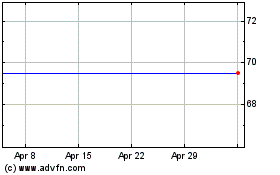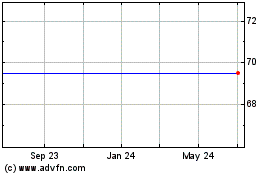Aluminum Mills, Can Makers at Odds Over Tariff Exemptions
July 23 2020 - 9:29AM
Dow Jones News
By Bob Tita
Aluminum customers are receiving tariff exclusions on billions
of pounds of imported metal that U.S. mills say are undermining the
domestic market the duties were supposed to revive.
The 10% duty on foreign-made aluminum that the Trump
administration imposed in March 2018 allowed importers to receive
exclusions from the tariff for metal that wasn't available
domestically. But aluminum producers in the U.S. say the exclusion
process is incentivizing more imports, deepening a divide in the
industry over the tariff's effectiveness.
"The exclusion process has gotten out of control," said
Jean-Marc Germain, chief executive of Paris-based aluminum producer
Constellium SE, which operates five mills in the U.S. that account
for 40% of its sales. "It's being used as leverage in the domestic
aluminum industry. We're getting squeezed."
The Commerce Department has issued import exclusions for 7.6
billion pounds of aluminum this year through early June, after
excluding 10.7 billion pounds for all of 2019, according to the
Arlington, Va.-based Aluminum Association, a trade group. The group
opposes the tariff because it says duties are ineffective against
cheap exports from China that have caused a global aluminum glut.
The association has urged the Commerce Department to stop issuing
tariff exclusions for imports from China.
"Exclusions are only granted in cases where no U.S. producer
demonstrates the ability to provide the requested product," a
Commerce Department spokesman said. The department has initiated a
review of the exclusion process.
The Aluminum Association said rising tariff exclusions are
helping to drive import volumes higher for products that were
previously supplied almost entirely by domestic mills. Can-sheet
imports increased to 403 million pounds last year from 188 million
in 2018, said the association, citing Commerce Department import
totals. Imports of foil and other aluminum products also
increased.
Constellium and other rollers of aluminum products say the
tariff waivers are enabling their customers, particularly
beverage-can makers, to shift purchases abroad if they aren't
granted price cuts or more favorable contract terms.
Prices for can sheet have crept up this year to 37 cents to 38
cents a pound above the cost of raw aluminum from 35.5 cents in
2019, market forecaster CRU Group estimates. CRU said mills have
restrained price increases, despite rising demand.
Ball Corp., the largest U.S. maker of aluminum cans by sales,
says rolling mills haven't kept up with rising demand for cans.
"No company has added any significant domestic capacity since
the tariff went into effect," Ball said in comments to the Commerce
Department this month about suggested changes to the exclusion
process.
Chicago-based can maker Ardagh Metal Packaging USA Inc. said in
comments to the Commerce Department that domestic rolling mills'
assurances about adequate production capacity are disingenuous.
"Aluminum can sheet must be imported from foreign suppliers,"
Ardagh said.
Ball said its production was 4% higher in the first quarter than
a year earlier because of rising demand for canned beverages. As
the coronavirus pandemic limits activity at bars and restaurants,
consumption of canned beer and soda at home has increased, the
company said.
Colorado-based Ball, which makes 100 billion cans annually, is
adding capacity to plants in Georgia and Texas and intends to build
new plants in Arizona, Georgia and in the Northeast to meet demand
for unconventional can sizes. Popular energy drinks and spiked
seltzer water require different coils of aluminum that aren't
always available in the U.S.
Constellium said it can accommodate can makers' higher volumes
after investing $1.8 billion in its U.S. plants over the last five
years to prepare for growth. Other rolling companies also said they
have capacity for more can-sheet orders.
Some U.S. aluminum rollers are switching back to producing more
can sheet this year after demand dropped for the higher-margin
aluminum they make for automotive bodies. Car makers and other big
manufacturers have cut production because of operational hurdles
and the wider economic malaise resulting from the coronavirus
pandemic. Industrywide domestic shipments of can sheet in May and
June increased by 6% and 6.5%, respectively, from last year.
Rolling mills and the Aluminum Association say can manufacturers
are flooding the Commerce Department with duplicate exclusion
requests to increase their odds of getting some of them approved
and bogging down the mills with paperwork needed to object to the
requests.
Can manufacturers say that because the Commerce Department's
waivers expire after a year, they have to request exclusions
repeatedly to insure they have enough aluminum for customers with
multiyear contracts.
The U.S. agency also requires separate exclusions for slight
variations in the variety or size of imports. The monthslong review
process, a lengthy rebuttal process and the coronavirus all make it
necessary to file exclusion requests frequently, can makers
said.
"The need to file year round is even more pronounced due to the
Covid-19 pandemic and the uncertainty it has caused around supply
and demand," Ball said.
Write to Bob Tita at robert.tita@wsj.com
(END) Dow Jones Newswires
July 23, 2020 09:14 ET (13:14 GMT)
Copyright (c) 2020 Dow Jones & Company, Inc.
Ball (NYSE:BLL)
Historical Stock Chart
From Mar 2024 to Apr 2024

Ball (NYSE:BLL)
Historical Stock Chart
From Apr 2023 to Apr 2024
